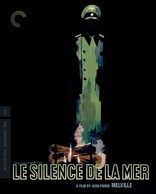Le silence de la mer Blu-ray Movie
HomeLe silence de la mer Blu-ray Movie 
The Silence of the SeaCriterion | 1949 | 87 min | Not rated | Apr 28, 2015
Movie rating
7.8 | / 10 |
Blu-ray rating
| Users | 0.0 | |
| Reviewer | 5.0 | |
| Overall | 5.0 |
Overview
Le silence de la mer (1949)
Under Nazi occupation, an elderly Frenchman and his niece must board a German officer. As a form of resistance, they enter pact of silence when the officer is present. But as time passes, they realize he far differs from their expectations.
Starring: Howard Vernon, Nicole Stéphane, Jean-Marie Robain, Ami Aaröe, Georges PatrixDirector: Jean-Pierre Melville
| Foreign | Uncertain |
| Drama | Uncertain |
| Romance | Uncertain |
| War | Uncertain |
Specifications
Video
Video codec: MPEG-4 AVC
Video resolution: 1080p
Aspect ratio: 1.33:1
Original aspect ratio: 1.37:1
Audio
French: LPCM Mono (48kHz, 24-bit)
Subtitles
English
Discs
50GB Blu-ray Disc
Single disc (1 BD)
Playback
Region A (locked)
Review
Rating summary
| Movie | 5.0 | |
| Video | 4.5 | |
| Audio | 4.0 | |
| Extras | 5.0 | |
| Overall | 5.0 |
Le silence de la mer Blu-ray Movie Review
Reviewed by Dr. Svet Atanasov March 29, 2015Jean-Pierre Melville's "Le silence de la mer" (1949) arrives on Blu-ray courtesy of Criterion. The supplemental features on the disc include Melville's first directorial effort, "24 Hours in the Life of a Clown" (1946); Olivier Bohler's documentary film "Code Name: Melville" (2008); Pierre-Henri Gilbert's documentary film "Melville Steps Out of the Shadows" (2010); exclusive new video interview with film professor Ginette Vincendeau; and archival interview from the French television program Cinepanorama. The release also arrives with a 38-page illustrated booklet featuring an essay by critic Geoffrey O'Brien and a selection from Rui Nogueira’s 1971 book Melville on Melville. In French, with optional English subtitles for the main feature. Region-A "locked".
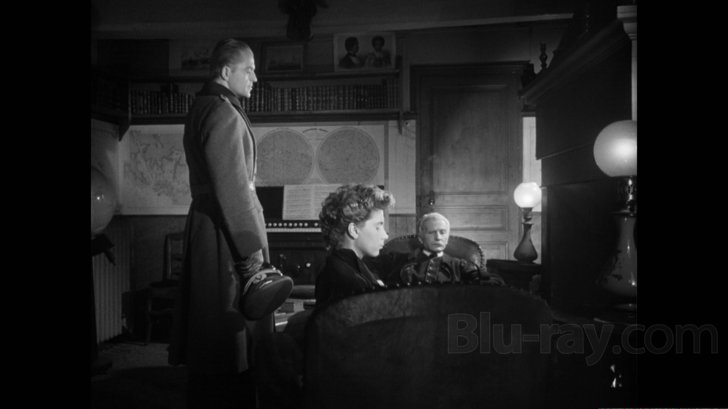
The unwanted guest
A small village somewhere in France, 1941. A German officer (Howard Vernon, Vice and Virtue) is billeted to the house of an elderly man (Jean-Marie Robain, Bob Le Flambeur) and his niece (Nicole Stephanie, Les Enfants Terribles). After he settles down, he tries to have a conversation with his hosts, but they remain silent and continue to live their lives as if he does not exist.
The officer is a kind and very intelligent man who is in love with French literature, art and music. He sees the war not as a tragedy but as the perfect opportunity for his country and France to unite, learn from each other and rebuild Europe. He understands that lives will be lost but believes that it is a price that must be paid.
Day after day the officer meets his hosts and talks to them about his life as a musician before the war, his conservative father, the French writers who made him fall in love with France. They listen carefully, but never engage in a conversation with him.
Eventually, the elderly man begins to admire the officer’s passion for France and its culture. His niece also falls in love with him. But they don’t reveal their feelings to him. The officer also does not confront them because he understands perfectly well why they have chosen to remain silent.
Then, one day the officer is ordered to appear before his superiors in Paris. There, they reveal to him that they are planning to transform France -- after they cleanse it, they will destroy its cultural heritage and national identity. Shocked and appalled, the officer immediately requests that he is transferred to the Eastern Front. Shortly after, he returns to the village and bids his hosts goodbye.
Based on the popular novel by Vercors (a pseudonym for French resistance fighter and writer Jean Bruller), Jean-Pierre Melville’s first feature film, Le Silence de la mer, is widely regarded by many as one of the most important French films from the beginning of the century. It was completed in 1949, seven years after Vercors’ book was secretly published in Nazi-occupied Paris.
The film is notably quiet and unusually lyrical. There are long noirish sequences in it that remind of Melville’s chic gangster films where the camera moves slowly and carefully observes the main protagonists from afar. The atmosphere, however, is far more relaxed.
The overwhelming majority of the film takes place in a single room. The elderly man explains his decision to remain silent and shares his impressions of the officer in a series of monologues. Then the officer talks about the war, his love for France and his plans for the future. They never confront each other, but what is on display here is a clash of ideas.
Like the elderly man, who eventually begins to respect his guest, and his niece, who secretly falls in love with him, the officer undergoes a serious character transformation. When he first enters the house he is an enthusiastic and hopeful man who believes that the world is changing for the better; he is an idealist who has arrived in France to admire it, not to conquer it. After he returns from Paris, however, he becomes a different man; he looks defeated and sad because he has suddenly realized that he has been part of something terrible, something enormously tragic.
Mleville’s Le silence de la mer is the one and only French film about the Resistance that I have seen where not all Germans are portrayed as delusional monsters. This isn’t to say that the film does not condemn them, it most certainly does; but it also makes the clear distinction that at least some of them were truly unaware that they were being misled by their leaders. (For a contrasting point of view see Rene Clement's La bataille du rail).
Note: Le silence de la mer had an enormous impact on a number of Nouvelle Vague directors, including Francois Truffaut, Eric Rohmer, and Claude Chabrol, who later on attempted to imitate the simplicity of its narrative structure in their films.
Le silence de la mer Blu-ray Movie, Video Quality 
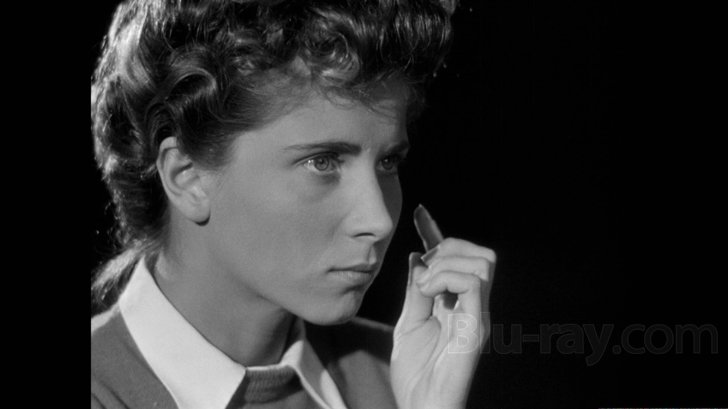
Presented in an aspect ratio of 1.33:1, encoded with MPEG-4 AVC and granted a 1080p transfer, Jean-Pierre Melville's Le silence de la mer arrives on Blu-ray courtesy of Criterion.
The release uses as a foundation French label Gaumont's restoration of Le silence de la mer, which was initially released on Blu-ray by British distributors Eureka Entertainment (you can see our review of their release here). I liked the release quite a lot as it represented a major upgrade in quality over the old R2 DVD release. Criterion's technical presentation of the film is very similar. The majority of the close-ups convey lovely depth, with the well-lit close-ups in particular looking very good. With the exception of the raw inserts (you will know when they appear as the shift in quality is quite obvious), the outdoor footage boasts pleasing clarity. Grain is present throughout the entire film, but in some areas it could be somewhat underexposed. These fluctuations are hardly surprising, however, as it is very easy to tell that time has left its mark on the elements that were used to produce the master. In fact, it is easy to see that some work has been done to rebalance the image as best as possible. (Do not be concerned as these are not compromising degraining/denoising adjustments -- the film does have a pleasing organic appearance). A few transitions are a bit uneven, but there are no serious stability issues. Lastly, there are no large cuts, damage marks, debris, or stains to report in this review. To sum it all up, while I do believe that there is some room for improvement, the current technical presentation of La silence de la mer is indeed very pleasing. (Note: This is a Region-A "locked" Blu-ray release. Therefore, you must have a native Region-A or Region-Free PS3 or SA in order to access its content).
Le silence de la mer Blu-ray Movie, Audio Quality 
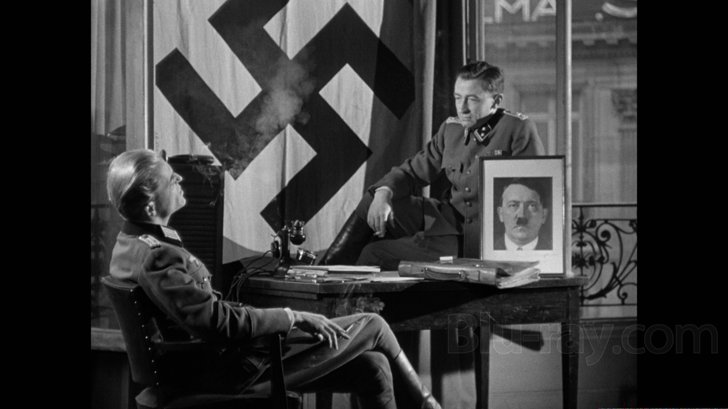
There is only one standard audio track on this Blu-ray release: French LPCM 1.0. For the record, Criterion have provided optional English subtitles for the main feature.
The extremely light background that I mentioned in our review of Eureka Entertainment's release is also present here. It never becomes distracting, but it can be felt. The dialog is stable and easy to follow, but the range of nuanced dynamics is very limited. In fact, even where Edgar Bischoff's score attempts to enhance the dramatic atmosphere, the overall dynamic movement is quite modest. Obviously, however, such is the film's original sound design. There are no pops, cracks, audio dropouts, or digital distortions.
Le silence de la mer Blu-ray Movie, Special Features and Extras 
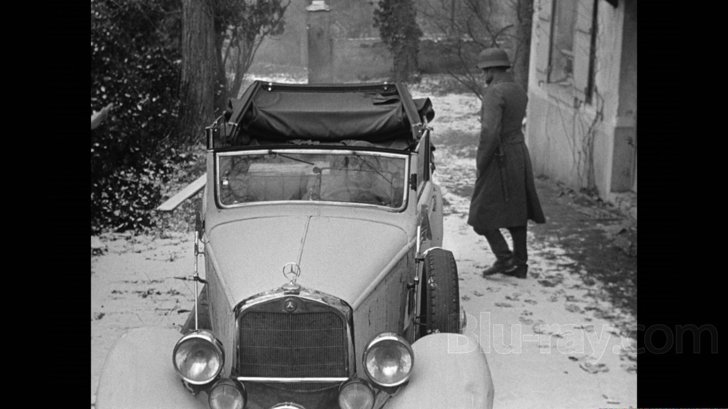
- 24 Hours in the Life of a Clown (1946) - presented here is Jean-Pierre Melville's first directorial work, the short film 24 heures de la vie d'un clown a.k.a. 24 Hours in the Life of a Clown. It offers a glimpse into the lives of Beby and Maiss, two aging clowns living in Paris whose best days are behind them. In French, with optional English subtitles. (19 min, 1080p).
- Code Name: Melville - produced by Olivier Bohler in 2008, this documentary film focuses on Jean-Pierre Melville's life and career and the evolution of his unique style (as well as the specific impact his films have had on directors from different generations). Included in it are extracts from archival interviews with the French director, his secretary and friend Leo Fortel, filmlmaker and critic Andre S. Labarthe, Melville's nephew Remy Grumbach, veteran Hong Kong director Johnnie To (Running Out of Time, Throw Down), German director Volker Schlöndorff (The Tin Drum), actor Pierre Grasset (Rififi), Japanese director Masahiro Kobayashi (Man Walking on Snow), and French director Bertrand Tavernier (Coup de Torchon), amongst others. In French and Cantonese, with optional English subtitles (and printed French subtitles for the Cantonese dialog). (77 min, 1080p).
- Melville Steps Out of the Shadows - produced by Pierre-Henri Gilbert in 2010, this documentary focuses on the production history of Jean-Pierre Melville's Le silence de la mer and some of the key elements of his unique style. Included in it are interviews with writer and film historian Denitza Bantcheva (Jean-Pierre Melville: From the Films to the Man), cinematographer Pierre Lhomme (Army of Shadows), director Volker Schlöndorff, writer Rui Nogueira (Cinema According to Melville), journalist and filmmaker Philippe Labro, and actress Nicole Stéphane (Les Enfants Terribles). In French, with optional English subtitles. (43 min, 1080p).
- Ginette Vincendeau - in this brand new video interview, film professor Ginette Vincendeau, author of Jean-Pierre Melville: An American in Paris, discusses Le silence de la mer and Jean-Pierre Melvile's interaction with Vercors (whose novel inspired it), the director's love for American cinema, and the style and atmosphere of his films. The interview was conducted exclusively for Criterion in 2014. In English, not subtitled. (18 min, 1080p).
- Cinepanorama - presented here is an archival interview with Jean-Pierre Melville about Le silence de la mer and the adaptation of Vercors' novel, which was conducted by Francois Chalais. It was originally aired on April 18, 1959, as part of the French television program Cinepanorama, which was directed by Jean Bescont. In French, with optional English subtitles. (2 min, 1080p).
- Booklet - an illustrated booklet featuring an essay by critic Geoffrey O'Brien and a selection from Rui Nogueira's 1971 book Melville on Melville.
Le silence de la mer Blu-ray Movie, Overall Score and Recommendation 
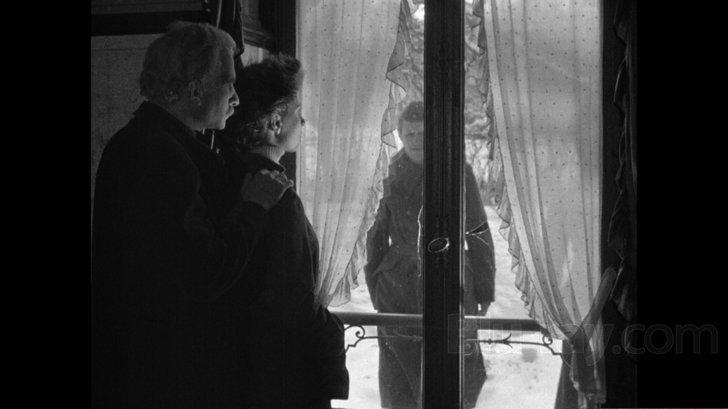
Jean-Pierre Melvile's Le silence de la mer is a thought-provoking period drama which offers a balanced point of view that is rarely, if ever, present in films about the Resistance. What makes the film so fascinating to behold, however, is its simplicity and style, both of which will later on have a major impact on the Nouvelle Vague directors. Criterion's upcoming Blu-ray release uses as a foundation French label Gaumont's restoration of Le silence de la mer. Amongst the supplemental features on the disc are two excellent documentaries: Pierre-Henri Gilbert's Melville Steps Out of the Shadows and Olivier Bohler's Code Name: Melville. VERY HIGHLY RECOMMENDED.
Similar titles
Similar titles you might also like

Army of Shadows
L'armée des ombres / Better encode than 2011 release
1969

The Last Metro
Le dernier métro
1980

Children of Paradise
Les enfants du paradis
1945

Léon Morin, Priest
Léon Morin, prêtre
1961

L' Atalante
1934

Jules and Jim
Jules et Jim
1962

Pierrot le fou
1965

Hiroshima mon amour
1959

Betty Blue
37°2 le matin | Director's Cut
1986

Army of Crime
L'armée du crime
2009

Vivre sa vie
Vivre sa vie: Film en douze tableaux / My Life to Live
1962

Masculin Féminin
1966

The Battle of Algiers
La battaglia di Algeri
1966

The Earrings of Madame de...
Madame de...
1953

Three Colors: Red
Trois couleurs: Rouge
1994

My Mother
Ma mère / Slipcover in Retailer Pressing
2004

Lacombe, Lucien
1974

A Woman Is a Woman
Une femme est une femme
1961

La Grande Illusion
Grand Illusion
1937

Let the Sunshine In
Un beau soleil intérieur
2017
